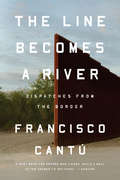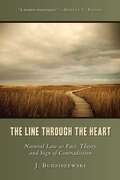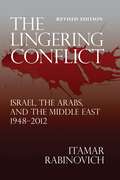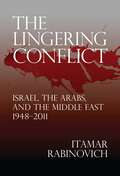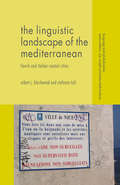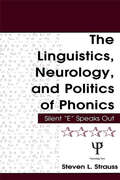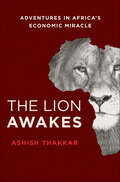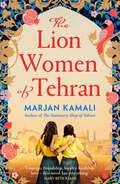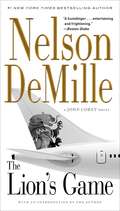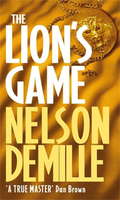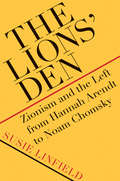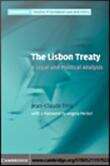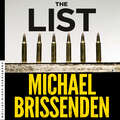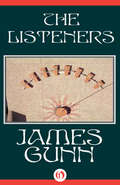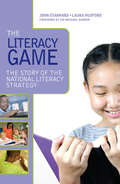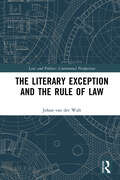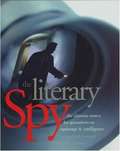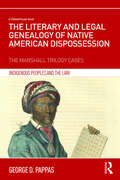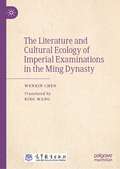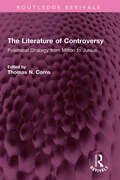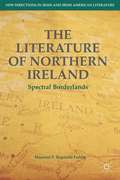- Table View
- List View
The Line Becomes a River: Dispatches from the Border
by Francisco Cantú"A must-read for anyone who thinks "build a wall" is the answer to anything." --EsquireFor Francisco Cantú, the border is in the blood: his mother, a park ranger and daughter of a Mexican immigrant, raised him in the scrublands of the Southwest. Haunted by the landscape of his youth, Cantú joins the Border Patrol. He and his partners are posted to remote regions crisscrossed by drug routes and smuggling corridors, where they learn to track other humans under blistering sun and through frigid nights. They haul in the dead and deliver to detention those they find alive. Cantú tries not to think where the stories go from there.Plagued by nightmares, he abandons the Patrol for civilian life. But when an immigrant friend travels to Mexico to visit his dying mother and does not return, Cantú discovers that the border has migrated with him, and now he must know the whole story. Searing and unforgettable, The Line Becomes a River goes behind the headlines, making urgent and personal the violence our border wreaks on both sides of the line
The Line Through the Heart: Natural Law as Fact, Theory, and Sign of Contradiction
by J. BudziszewskiWhy do we demand happiness on terms that make happiness impossible? And what can we do about it? Acclaimed philosopher J. Budziszewski addresses these questions in the brilliantly persuasive book The Line Through the Heart, finding the answers in the natural law. The journey of exploration takes us through politics, religion, ethics, law, philosophy, and more, with Budziszewski as expert guide. While investigating the natural law and its implications, Budziszewski boldly confronts a wide range of contemporary issues, offering a newly integrated view of abortion, evolution, euthanasia, capital punishment, runaway courts, and the ersatz state religion built in the name of religious toleration. Written in Budziszewski's usual crystalline style, The Line Through the Heart shows that natural law is a matter of concern not merely to scholars but to everyone, for it touches how each of us lives, and how all of us live together. His profound examination of this subject helps us make sense of why habits that run against our nature have become second nature, and why our world seems to be going mad.
The Lingering Conflict
by Itamar RabinovichIn The Lingering Conflict Itamar Rabinovich, a former chief negotiator for Israel, provides unique and authoritative insight into the prospects for genuine peace in the Middle East. His presentation includes a detailed insider account of the peace processes of 1992-96 and a frank dissection of the more dispiriting record since then.Rabinovich's firsthand experiences as a negotiator and as Israel's ambassador to the United States provide a valuable perspective from which to view the major players involved. Fresh analysis of ongoing situations in the region and the author's authoritative take on key figures such as Ehud Barak and Benjamin Netanyahu shed new light on the long and tumultuous history of Arab-Israeli relations. His book is a shrewd assessment of the past and current state of affairs in the Middle East, as well as a sober look at the prospects for a peaceful future.While Rabinovich explains the conflict between Israel and the Palestinians--a classic dispute between two national movements claiming the same land-- The Lingering Conflict also considers the broader political, cultural, and increasingly religious conflict between the Jewish state and Arab nationalism. He approaches the troubled region in an international context, offering provocative analysis of America's evolving role and evaluation of its diplomatic performance.This book builds on the author's previous seminal work on geopolitics in the Middle East, particularly Waging Peace. As Rabinovich brings the Arab-Israeli conflict up to date, he widens the scope of his earlier insights into efforts to achieve normal, peaceful relations. And, of course, he takes full account of recent social and political tumult in the Middle East, discussing the Arab Spring uprisings--and the subsequent retaliation by dictators such as Syria's al-Asad and Libya's Qaddafi--in the context of Arab-Israeli relations.
The Lingering Conflict
by Itamar RabinovichIn The Lingering Conflict Itamar Rabinovich, a former chief negotiator for Israel, provides unique and authoritative insight into the prospects for genuine peace in the Middle East. His presentation includes a detailed insider account of the peace processes of 1992-96 and a frank dissection of the more dispiriting record since then.Rabinovich's firsthand experiences as a negotiator and as Israel's ambassador to the United States provide a valuable perspective from which to view the major players involved. Fresh analysis of ongoing situations in the region and the author's authoritative take on key figures such as Ehud Barak and Benjamin Netanyahu shed new light on the long and tumultuous history of Arab-Israeli relations. His book is a shrewd assessment of the past and current state of affairs in the Middle East, as well as a sober look at the prospects for a peaceful future.While Rabinovich explains the conflict between Israel and the Palestinians-a classic dispute between two national movements claiming the same land- The Lingering Conflict also considers the broader political, cultural, and increasingly religious conflict between the Jewish state and Arab nationalism. He approaches the troubled region in an international context, offering provocative analysis of America's evolving role and evaluation of its diplomatic performance.This book builds on the author's previous seminal work on geopolitics in the Middle East, particularly Waging Peace. As Rabinovich brings the Arab-Israeli conflict up to date, he widens the scope of his earlier insights into efforts to achieve normal, peaceful relations. And, of course, he takes full account of recent social and political tumult in the Middle East, discussing the Arab Spring uprisings-and the subsequent retaliation by dictators such as Syria's al-Asad and Libya's Qaddafi-in the context of Arab-Israeli relations.
The Lingering Conflict
by Itamar RabinovichIn The Lingering Conflict Itamar Rabinovich, a former chief negotiator for Israel, provides unique and authoritative insight into the prospects for genuine peace in the Middle East. His presentation includes a detailed insider account of the peace processes of 1992-96 and a frank dissection of the more dispiriting record since then.Rabinovich's firsthand experiences as a negotiator and as Israel's ambassador to the United States provide a valuable perspective from which to view the major players involved. Fresh analysis of ongoing situations in the region and the author's authoritative take on key figures such as Ehud Barak and Benjamin Netanyahu shed new light on the long and tumultuous history of Arab-Israeli relations. His book is a shrewd assessment of the past and current state of affairs in the Middle East, as well as a sober look at the prospects for a peaceful future.While Rabinovich explains the conflict between Israel and the Palestinians-a classic dispute between two national movements claiming the same land- The Lingering Conflict also considers the broader political, cultural, and increasingly religious conflict between the Jewish state and Arab nationalism. He approaches the troubled region in an international context, offering provocative analysis of America's evolving role and evaluation of its diplomatic performance.This book builds on the author's previous seminal work on geopolitics in the Middle East, particularly Waging Peace. As Rabinovich brings the Arab-Israeli conflict up to date, he widens the scope of his earlier insights into efforts to achieve normal, peaceful relations. And, of course, he takes full account of recent social and political tumult in the Middle East, discussing the Arab Spring uprisings-and the subsequent retaliation by dictators such as Syria's al-Asad and Libya's Qaddafi-in the context of Arab-Israeli relations.
The Linguistic Landscape of the Mediterranean: French and Italian Coastal Cities (Language and Globalization)
by Robert J. Blackwood Stefania TufiThis book explores the Linguistic Landscapes of ten French and Italian Mediterranean coastal cities. The authors address the national languages, the regional languages and dialects, migrant languages, and the English language, as they collectively mark the public space.
The Linguistics, Neurology, and Politics of Phonics: Silent "E" Speaks Out
by Steven L. StraussThis book explores the driving forces behind the current government-sponsored resurrection of phonics, and the arguments used to justify it. It examines the roles played by three key actors--corporate America, politicians, and state-supported reading researchers--in the formulation of what Strauss terms the neophonics political program. Essential for researchers, students, and teachers of literacy and reading, and for anyone seeking to understand what is happening in U.S. public schools today, The Linguistics, Neurology, and Politics of Phonics: Silent "E" Speaks Out:*analyzes the political nature of the alleged literacy crisis in the United States, through an investigation of the political and corporate motives behind the renewed focus on phonics, and media complicity in promoting the neophonics political program as the solution to the so-called crisis;*examines the scientific claims of neophonics, including methodology, linguistics, and neuroscience, and exposes the flaws in its reasoning and the weakness of its arguments;*addresses the scientific, empirical investigation of letter-sound relationships in English (of phonics itself), and demonstrates the complexity of the system and its associated benefits and limitations in the theory and practice of reading;*proposes actions to help make a return to politically undistorted science and to democratic classrooms a reality; and*introduces, in a postscript, a formal analysis of the letter-sound system, using empirically based rules to convert one finite set of elements, the alphabet, into another, the phonemes of the spoken language. Offering up-to-date information and an original critique, this book makes two important contributions. One is the policy analysis linking government agencies, policymakers, and corporate interests. The second is the neurological and linguistic treatment of why traditional phonics programs are not the solution and why the rhetoric developed to support their resurgence is so far off the mark.
The Lion Awakes: Adventures in Africa's Economic Miracle
by Ashish ThakkarThree little known facts: Africa is now the world's fastest growing continent, with average GDP growth of 5.5% the past 10 years. Malaria deaths have declined by 30% and HIV infections by 74%. Nigeria produces more movies than America does.The Lion Awakes is the true story of today's Africa, one often overshadowed by the dire headlines. Traveling from his ancestral home in Uganda, East Africa, to the booming economy and (if chaotic) new democracies of West Africa, and down to the "Silicon Savannahs" of Kenya and Rwanda, Ashish J. Thakkar shows us an Africa that few Westerners are aware exists. Far from being a place in need of our pity and aid, we see a continent undergoing a remarkable transformation and economic development. We meet a new generation of ambitious, tech savvy young Africans who are developing everything from bamboo bicycles to iPhone Apps; we meet artists, film makers and architects thriving with newfound freedom and opportunity, and we are introduced to hyper-educated members of the Diaspora who have returned to Africa after years abroad to open companies and take up positions in government. They all tell the same story: 21st Century Africa offers them more opportunity than the First World. Drawing from his business experience, and his own family's history in Africa, which include his parents' expulsion from Uganda by Idi Amin in the 70s and his own survival of the Rwandan genocide in 1994, Ashish shows us how much difference a decade can make.
The Lion Women of Tehran: The life-affirming BBC Radio 2 Book Club pick
by Marjan KamaliA BBC RADIO 2 BOOK CLUB PICK 'As heart-wrenching as it is achingly beautiful' Sadeqa Johnson, author of The House of Eve'Heartbreaking and life affirming' Adrienne Brodeur, author of Little Monsters'Courage, friendship, loyalty, hardship, love – this novel has everything' Mary Beth Keane, Ask Again, YesFrom the author of The Stationery Shop of Tehran, a heartfelt, epic new novel of friendship, betrayal and redemption set against three transformative decades in Tehran, Iran. In 1950s Tehran, seven-year-old Ellie lives in grand comfort until the untimely death of her father, forcing Ellie and her mother to move to a tiny home downtown. Lonely and bearing the brunt of her mother&’s endless grievances, Ellie dreams of a friend to alleviate her isolation. Luckily, on the first day of school, she meets Homa, a kind, passionate girl with a brave and irrepressible spirit. Together, the two girls play games, learn to cook in the stone kitchen of Homa&’s warm home, wander through the colorful stalls of the Grand Bazaar, and share their ambitions for becoming 'lion women.' But their happiness is disrupted when Ellie and her mother are afforded the opportunity to return to their previous bourgeois life. Now a popular student at the best girls&’ high school in Iran, Ellie&’s memories of Homa begin to fade. Years later, however, her sudden reappearance in Ellie&’s privileged world alters the course of both of their lives. Together, the two young women come of age and pursue their own goals for meaningful futures. But as the political turmoil in Iran builds to a breaking point, one earth-shattering betrayal will have enormous consequences.Praise for Marjan Kamali &‘Evocative, devastating, and hauntingly beautiful&’ Whitney Scharer, author of The Age of Light &‘A beautifully immersive tale&’ Jasmin Darznik, author of The Good Daughter and Song of a Captive Bird &‘At once masterfully plotted, beautifully written, and populated by characters who are arresting, lovable and so real&’ Elinor Lipman, author of Turpentine Lane &‘A sweeping romantic tale of thwarted love&’ Kirkus Reviews &‘Enchanting&’ My Weekly
The Lion's Game (A John Corey Novel #2)
by Nelson DeMilleDetective John Corey, last seen in Plum Island, now faces his toughest assignment yet: the pursuit and capture of the world's most dangerous terrorist -- a young Arab known as "The Lion" who has baffled a federal task force and shows no sign of stopping in his quest for revenge against the American pilots who bombed Libya and killed his family. Filled with unrelenting suspense and surprising plot twists at every terrifying turn, The Lion's Game is a heartstopping race against time and one of Nelson DeMille's most riveting thrillers.
The Lion's Game: Number 2 in series (John Corey #2)
by Nelson DeMilleApril 1986 : American F-111 warplanes bomb the Al Azziyah compound in Libya where President Gadhafi is residing. A 16-year-old youth, Asad - Arabic for 'lion ' - loses his mother, two brothers and two sisters in the raid. Asad sees himself as chosen to avenge not only his family but his nation, his religion and the Great Leader - Gadhafi. An eye for an eye, a tooth for a tooth.Twelve years later, Asad arrives in New York City, intent on killing all five surviving pilots across America who participated in the bombing, one by one. John Corey - from the international bestseller PLUM ISLAND - is no longer with the NYPD and is working for the Anti-Terrorist Task Force. He has to stop Asad's revenge killings. But first he has to find him.A thrillingly entertaining read from a master storyteller.
The Lion, the Fox and the Eagle
by Carol OffThree Canadians - Lewis MacKenzie, Romeo Dallaire and Louise Arbour - were at the centre of the two greatest tragedies of the 1990s. Two of them could have stopped the killing. One was asked to bring the perpetrators to justice. In this riveting, original and explosive book, Carol Off explores the failure of peacekeeping missions in Sarajevo and Rwanda, and the international community's attempt to redeem itself by prosecuting the people responsible for the genocides. Events turned on the action of two Canadian generals: the fox of the title, Lewis MacKenzie, who commanded the UN forces in Bosnia for the first crucial months of the conflict; and the lion, Romeo Dallaire, who developed an interventionary plan that he believed would have prevented the Rwandan genocide but was forced by the UN to stand by while 800,000 people were slaughtered. The eagle is Louise Arbour, a Canadian judge who became Chief Prosecutor for War Crimes in Rwanda and the former Yugoslavia.From the Trade Paperback edition.
The Lions of Lucerne: The Lions Of Lucerne, Path Of The Assassin, And State Of The Union (The Scot Harvath Series #1)
by Brad ThorIn his daring and chilling first novel, #1 New York Times bestselling author Brad Thor draws us into a sinister labyrinth of political intrigue and international terrorism, serving up an explosive cocktail of unrelenting action as one man is pushed to the edge.On the snow-covered slopes of Utah, the President of the United States has been kidnapped and his Secret Service detail massacred. Only one agent has survived—ex-Navy SEAL Scot Harvath. He doesn&’t buy the official line that Middle Eastern terrorists are behind the attack and begins his own campaign to find the truth and exact revenge. But now, framed for murder by a sinister cabal, Harvath takes his fight to the towering mountains of Switzerland—and joins forces with beautiful Claudia Mueller of the Swiss Federal Attorney&’s Office. Together they must brave the subzero temperatures and sheer heights of treacherous Mount Pilatus—where their only chance for survival lies inside the den of the most lethal team of professional killers the world has ever known…
The Lions' Den: Zionism and the Left from Hannah Arendt to Noam Chomsky
by Susie LinfieldA lively intellectual history that explores how prominent midcentury public intellectuals approached Zionism and then the State of Israel itself and its conflicts with the Arab world In this lively intellectual history of the political Left, cultural critic Susie Linfield investigates how eight prominent twentieth-century intellectuals struggled with the philosophy of Zionism, and then with Israel and its conflicts with the Arab world. Constructed as a series of interrelated portraits that combine the personal and the political, the book includes philosophers, historians, journalists, and activists such as Hannah Arendt, Arthur Koestler, I. F. Stone, and Noam Chomsky. In their engagement with Zionism, these influential thinkers also wrestled with the twentieth century’s most crucial political dilemmas: socialism, nationalism, democracy, colonialism, terrorism, and anti-Semitism. In other words, in probing Zionism, they confronted the very nature of modernity and the often catastrophic histories of our time. By examining these leftist intellectuals, Linfield also seeks to understand how the contemporary Left has become focused on anti-Zionism and how Israel itself has moved rightward.
The Lisbon Treaty
by Jean-Claude PirisGiven the controversies and difficulties which preceded the coming into force of the Lisbon Treaty, it is easy to forget that the Treaty is a complex legal document in need of detailed analysis for its impact to be fully understood. Jean-Claude Piris, the Director General of the Legal Service of the Council of the European Union, provides such an analysis, looking at the historical and political contexts of the Treaty, its impact on the democratic framework of the EU and its provisions in relation to substantive law. Impartial legal analysis of the EU's functions, its powers and the treaties which govern it make this the seminal text on the most significant recent development in EU law.
The List
by Michael BrissendenSidney Allen is a Fed. Part of the Australian Federal Police's K block, a unit doing whatever it takes in order to stop terrorist attacks on home soil. But when young Muslim men on the Terror Watchlist start turning up dead, Sid and his partner, Haifa, have to work out what's going on. Sectarian war? Drugs? Retribution? <p><p>For Sid, there's nothing unclear about a bullet to the head and a severed hand. Someone is sending a message. Deciphering that message reveals a much wider threat and Sid and the agency have to decide just how far they'll go to prevent a deadly attack. Time is running out ... for them and Australia. From the brutal battlegrounds of Afghanistan, to the western Sydney suburbs and the halls of power in Canberra, THE LIST is a page-turning thriller where justice, revenge and the war on terror collide.
The Listeners
by James GunnAfter fifty-one long years of patient waiting, the message has finally arrived. They have dedicated their lives to trying to decipher the eerie silence that resounds from space and now there is finally a sound after decades of quiet. In the beginning there is a hail of celebration--the Project has finally produced results--but then the questions begin. What does the message mean? Could it be 'We come in peace' or 'Get ready for world domination'? The message baffles Earth. Only one man has the power to make the decision and it could mean intergalactic warfare if he makes the wrong choice. Director MacDonald holds in his hands the fate of Earth, the universe and the Project, which is dedicated to answering questions that have plagued humanity for centuries. Will he make the correct choice?
The Literacy Game: The Story of The National Literacy Strategy
by Laura Huxford John StannardContaining invaluable insights from the original director of the National Literary Strategy (NLS) and its director of training, this book provides the only systematic exploration of the reform programme. A vital introduction and critical appraisal for pracititioners and students, The Literacy Game examines the origins, evolution and impact of the NLS, and provides a fully comprehensive contribution to the teaching of literacy and the management of educational change. This illuminating text: sets out the political background and context to literacy education in England over a decade from 1996 to 2006 explains and appraises the rationale and design underpinning the NLS, thereby rebutting some of the folk-lore that has built up around it provides an example of the principles and practices of large-scale system change links the NLS to wider global research on system change and educational reform evaluates the contribution of the NLS in advancing knowledge of the literacy curriculum in English and the development of pedagogy as a whole considers the impact and consequences of the NLS on standards of literacy. The Literacy Game is an enlightening book which will appeal to all policy makers and academics who are keen to know what did and did not work in the NLS and why.
The Literary Exception and the Rule of Law (Law and Politics)
by Johan Van Der WaltAddressing the influential analysis of law and literature, this book offers a new perspective on their relationship. The law and literature movement that has gained global prominence in the course of last decades of the twentieth and the first decades of the twenty-first centuries has provided the research and teaching of law with a considerable body of new and valuable knowledge and understanding. Most of the knowledge and insights generated by the movement concern either a thematic overlap between legal and literary discourses – suggesting they deal with the same moral concerns – or a rhetorical, semiotic or general linguistic comparability or ‘sameness’ between them – imputing to both the same or very similar narrative structures. The Literary Exception and the Rule of Law recognises the wealth of knowledge generated by this approach to the relationship between law and literature, and acknowledges its debt to this genre of scholarship. It nevertheless also proposes, on the basis of a number of revealing phenomenological inquiries, a different approach to law and literary studies: one that emphasises the irreducible difference between law and literature. It does so with the firm believe that a regard for the very different and indeed opposite discursive trajectories of legal and literary language allows for a more profound understanding of the unique and indeed separate roles that the discourses of law and literature generally play in the sustenance of relatively stable legal cultures. This important rethinking of the relationship between law and literature will appeal to scholars and students of legal theory, jurisprudence, philosophy, politics and literary theory.
The Literary Spy: The Ultimate Source for Quotations on Espionage and Intelligence
by Charles E. LathropThe Literary Spy providesa unique view of the intelligence world through the words of its own major figures (and those fascinated with them) from ancient times to the present. CIA speechwriter and analyst Charles E. Lathrop has compiled and annotated more than 3,000 quotations from such disparate sources as the Bible, spy novels and movies, Shakespeare's plays, declassified CIA documents, memoirs, TV talk shows, and speeches from U. S. and foreign leaders and officials. Arranged in thematic categories with opening commentary for each section, the quotations speak for themselves. Together they serve both to illuminate a world famous for its secrets and deceptions and to show the extent to which intelligence has manifested itself in literature and in life. Engaging, informative, and often irreverent,The Literary Spyisan exceedingly satisfying book--one that meets the needs of the serious researcher just as ably as those of the armchair spy in pursuit of an evening's entertainment.
The Literary and Legal Genealogy of Native American Dispossession: The Marshall Trilogy Cases (Indigenous Peoples and the Law)
by George D PappasThe Literary and Legal Genealogy of Native American Dispossession offers a unique interpretation of how literary and public discourses influenced three U.S. Supreme Court Rulings written by Chief Justice John Marshall with respect to Native Americans. These cases, Johnson v. M’Intosh (1823), Cherokee Nation v. Georgia (1831) and Worcester v. Georgia (1832), collectively known as the Marshall Trilogy, have formed the legal basis for the dispossession of indigenous populations throughout the Commonwealth. The Trilogy cases are usually approached as ‘pure’ legal judgments. This book maintains, however, that it was the literary and public discourses from the early sixteenth through to the early nineteenth centuries that established a discursive tradition which, in part, transformed the American Indians from owners to ‘mere occupants’ of their land. Exploring the literary genesis of Marshall’s judgments, George Pappas draws on the work of Michel Foucault, Edward Said and Homi Bhabha, to analyse how these formative U.S. Supreme Court rulings blurred the distinction between literature and law.
The Literature and Cultural Ecology of Imperial Examinations in the Ming Dynasty
by Wenxin ChenThe book examines the relationship between imperial examinations and literature from the perspective of restoring the cultural ecology of imperial examinations in Ming China, breaking through the paradigm of pure literature research. This book presents an important practice in adjusting the pattern of literary research. The contents of this book include five mutually independent but supportive parts: 1) the living conditions and careers of the literary attendants; 2) the educational background and school’s consciousness of the Ming literati; 3) top candidates and Ming literature; 4) genres of imperial examination and the Ming society; 5) exam cheating cases from the perspective of politics and literature. This book will appeal to readers interested in Chinese literature and culture and the imperial examination system in ancient China.
The Literature of Controversy: Polemical Strategy from Milton to Junius (Routledge Revivals)
by Thomas N. CornsFirst published in 1987, The Literature of Controversy is a collection of essays by scholars from Britain, the United States, and Australia on major works from a classic epoch of English controversial prose. Each essay engages a single text or series of texts, less to discuss the ideas and arguments per se than to consider the rhetorical techniques assumed for the political manipulation of the readers. Though emphasis varies from contribution to contribution, the purpose, broadly, is to explore how the constituents of those texts are organised to coax, cajole, persuade or inspire those to whom they address. As the editor argues in his introduction, this approach, the critique of polemical strategy, for the most part accepts the validity of paying regard to the author and his intentions; it engages questions about the responses of the readership at which the texts were targeted; and it proceeds intertextuality in its attempts to reconstruct the controversies in which the texts were embedded and the codes within which they operated. This book will be of interest to students of literature, rhetoric and history.
The Literature of Northern Ireland
by Maureen E. Ruprecht FademThrough close readings of texts by playwright Anne Devlin, poet Medbh McGuckian, and novelist Anna Burns, this book examines the ways Irish cultural production has been disturbed by partition. Ruprecht Fadem argues that literary texts address this tension through spectral, bordered metaphors and juxtapositions of the ancient and the contemporary.
The Litigators
by Lindsay G. Arthur Jr.A waste site near Ruthie Bergstrom's house was recently treated with a new process using genetically engineered microbes, and suddenly Ruthie develops a mysterious neurological illness. By chance, she meets a passionate young lawyer at a neighborhood church supper. He feels obligated to find justice for his new struggling client and in the process takes on the largest law firm in Minnesota. How far will Dillon Love go for his client if the end result of his lawsuit is to destroy the brilliant university professor who has dedicated his entire life to improving the environment? How far will Henry Holten go to defeat the graceful woman whose family and financial future is dependent upon the success of her court case?The Litigators is a riveting page-turner, which asks if there can be any justice for either party without infliction of a great injustice on the other. This winner-takes-all legal battle brings together three tenacious lawyers and their highly worthy clients in a way that forever changes all of their lives.
